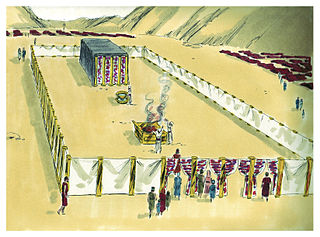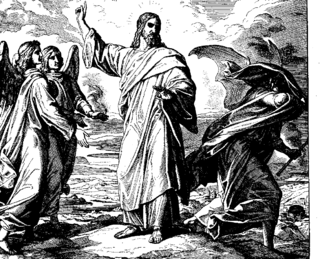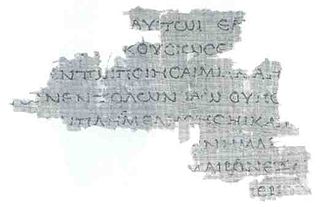
Leviticus 18 deals with a number of sexual activities considered abominable, including incest and bestiality. The chapter also condemns Moloch worship. It is part of the Holiness Code, and its sexual prohibitions are largely paralleled by Leviticus 20, except that chapter 20 has more emphasis on punishment.
Matthew 1:23 is the 23rd verse of the first chapter in the Gospel of Matthew in the New Testament. Joseph has just been informed of the nature of Jesus by an angel and in this verse the author of Matthew relates this to a quote from the Old Testament.

Matthew 4:7 is the seventh verse of the fourth chapter of the Gospel of Matthew in the New Testament. Satan has transported Jesus to the pinnacle of the Temple of Jerusalem and told Jesus that he should throw himself down, as God in Psalm 91 promised that no harm would befall him. In this verse, Jesus quotes scripture to rebuff the devil.

Matthew 4:10 is the tenth verse of the fourth chapter of the Gospel of Matthew in the New Testament. Jesus has rebuffed two earlier temptations by Satan. The devil has thus transported Jesus to the top of a great mountain and offered him control of the world to Jesus if he agrees to worship him. In this verse, Jesus rejects this temptation.
In contrast to the variety of absolute or personal names of God in the Old Testament, the New Testament uses only two, according to the International Standard Bible Encyclopaedia. From the 20th century onwards, "a number of scholars find various evidence for the name [YHWH or related form] in the New Testament.

John 20:28 is the twenty-eighth verse of the twentieth chapter of the Gospel of John in the New Testament. It is part of a description of what the book says is Jesus' reappearance to the disciples, including Thomas, eight days after his resurrection.

"I am the LORD thy God" is the opening phrase of the Ten Commandments, which are widely understood as moral imperatives by ancient legal historians and Jewish and Christian biblical scholars.

The manuscript 4Q120 is a Septuagint manuscript (LXX) of the biblical Book of Leviticus written on papyrus, found at Qumran. The Rahlfs-No. is 802. Paleographically it dates from the first century BCE. Currently the manuscript is housed in the Rockefeller Museum in Jerusalem.

Papyrus Oxyrhynchus 5101, designated by 2227, or P.Oxy.77 (LXXVII) 5101, is a manuscript of the Greek Septuagint Psalms, written on papyrus in roll form. It has survived in a very fragmentary condition. Using the study of comparative writings styles (palaeography), it has been dated to the middle of the first - middle of the second century CE.

4Q122 – is a septuagint manuscript written on parchment, dated from second century B.C.E.. The scroll contains a fragment of the biblical Book of Deuteronomy 11:4. It was found in a cave at Qumran in Cave 4. This fragment is also referred to as number 819 on the list of the Septuagint manuscripts according classification system by Alfred Rahlfs.

Jeremiah 28 is the twenty-eighth chapter of the Book of Jeremiah in the Hebrew Bible or the Old Testament of the Christian Bible. The material found in Jeremiah 28 of the Hebrew Bible appears in Jeremiah 35 in the Septuagint. This book contains prophecies attributed to the prophet Jeremiah, and is one of the Books of the Prophets. This chapter contains a confrontation between prophets Jeremiah and Hananiah: Hananiah's false prophecy is responded by Jeremiah's answer, Jeremiah 28:1-9. Hananiah breaks Jeremiah's yoke, Jeremiah foretells an iron yoke, and Hananiah's death, Jeremiah 28:10-17.

Jeremiah 34 is the thirty-fourth chapter of the Book of Jeremiah in the Hebrew Bible or the Old Testament of the Christian Bible. It is numbered as Jeremiah 41 in the Septuagint. This book contains prophecies attributed to the prophet Jeremiah, and is one of the Books of the Prophets. This chapter anticipates the final moments in the assault of the Babylonian army against Jerusalem, when Jeremiah foretold the destruction of the city and the captivity of King Zedekiah, and sharply criticized the treacherous dealings of the princes and people with the slaves that provoked the punishment from God.
Textual variants in the Gospel of Luke are the subject of the study called textual criticism of the New Testament. Textual variants in manuscripts arise when a copyist makes deliberate or inadvertent alterations to a text that is being reproduced. An abbreviated list of textual variants in this particular book is given in this article below.
Textual variants in the Hebrew Bible manuscripts arise when a copyist makes deliberate or inadvertent alterations to the text that is being reproduced. Textual criticism of the Hebrew Bible has included study of its textual variants.
Textual variants in the Book of Judges concerns textual variants in the Hebrew Bible found in the Book of Judges.
Textual variants in the Book of Deuteronomy concerns textual variants in the Hebrew Bible found in the Book of Deuteronomy.
Textual variants in the Book of Genesis concerns textual variants in the Hebrew Bible found in the Book of Genesis.
Textual variants in the Numbers concerns textual variants in the Hebrew Bible found in the Book of Numbers.
There are textual variants in the Hebrew Bible found in the Book of Leviticus.

 : Old Latin / Vetus Latina (list)
: Old Latin / Vetus Latina (list)









